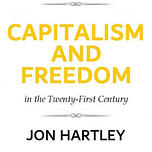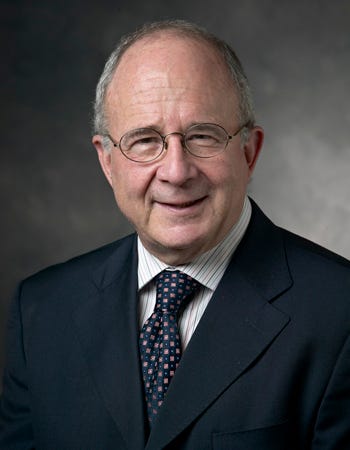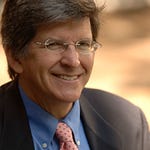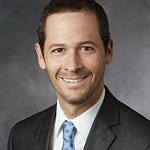Michael Bordo (Rutgers Economics Professor and Hoover Distinguished Visiting Fellow) joins the podcast to discuss his career, monetary history, the legacy of Bretton Woods 50 years later, and historical banking crises amid ongoing regional bank failures.
Jon: “This is the capitalism and Freedom in the 21st Century podcast, where we talk about economics, markets, and public policy. I'm Jon Hartley, your host. Today, I'm joined by Michael Bordo, a monetary historian and professor of economics at Rutgers University, Distinguished Visiting Fellow at the Hoover Institution, and a research associate at the National Bureau of Economic Research. Welcome.”
Michael: “Thank you.”
Jon: “Now, Michael, I want to first get into how you got interested in economics. You grew up in Montreal, and you also attended McGill. And then you went to the University of Chicago and studied under Milton Friedman for your PhD. Friedman is your dissertation advisor, and you were also at Chicago during a time when it was blessed with many international economists, many very famous international Canadian monetary economists. People like Harry Johnson, Bob Mondale, who won the Nobel Prize later, and very famous for Mondale-Fleming, the trilemma. I'm curious. How did you get interested in monetary economics to begin with, and how did you end up at Chicago?”
Michael: “Okay. Well, I studied economics at McGill. In fact, I did an honors economics and political science, and it's a very good. It is a good university. It was even a better university way back when, and they were very strong in economics. And I took an honor. I took this honors program, so there were small classes and really smart people, and I really got into it. But what got me into economic history and then monetary history was the first year we were there, we had to take a course, an introductory course, in economics, but it was economic history. And it was taught by F. Cyril James, who was the principal of the university, and he was a famous British economic historian who was an expert on the Great Depression, and specifically the Chicago Banking Panic of 1932. Okay, and he gave this incredible course, and he ended it with the story of what happened in 1931 when the entire international financial system collapsed. And so, I was hooked. And then I went into economics, I did micro, macro, all that stuff, right? And then I went to LSE, the London School of Economics. Back then in the 60s, Canadians, a lot of Canadians, went to England, that was part of the deal. So, I went there, I had great advisors and great people. I worked with Bill Phillips, Lord Robbins, okay, and a number of other people, Ed Mission, who was a student of ... who was a former student of Milton Friedman. And so, I did, you know, I had a great time at LSE, but I realized I needed to learn some more, that I didn't really have that strong background. And so, I was advised by Mission, my advisor, to go to Chicago, and I applied, and Harry Johnson, I got in touch with Harry Johnson, who was at Chicago, through the Mission connection. And he just, you know, opened up all the doors for me. So, I got funding, and I went from LSE to Chicago. And I arrived there, and I was assigned a student advisor, and it was Milton Friedman. You know, and I walked into his office, he said, you know, wow, you've got a great background, you know, McGill, LSE, dot, dot, dot, you know, and I just sort of got hooked. I took his courses. What year would this have been? This was 1965. So, I took Friedman's courses. I also did economic history with Robert Fogel, and I really liked him. And I did international with Harry, international trade, and Rob Mundell. And Mundell, he just arrived the same time as me, and he was like 10 years older. And I took his first course, and it was incredible. I loved it. Okay, he was just really, really, really hot, okay? And so, I did very well in his course. I took all his courses.”
Jon: “Had he come up with the Mundell-Fleming trilemma at this point?”
Michael: “It was in 1965, yeah. He did, well.”
Jon: “So he'd already worked at the IMF.”
Michael: “He'd already, his famous papers were already done, okay? I mean, the trilemma thing comes in later, people. That was an interpretation by, by, by, by Dornbusch, okay? Mundell didn't use that term, but Dornbusch is the one that came up with that. So, I was influenced by Harry, by Bob Mundell, by Bob Fogel, and by Milton Friedman. So, these were the influences that I had. But I also took courses from Stigler, who was great, you know? And there were some other people, and Al Harberger, too. So, I had fantastic teachers. And I started doing, in a sense, what I did. My dissertation was in monetary history, because one of the best things that came out of Friedman's courses was reading the monetary history of the United States. And that's been my bible ever since. And so, you know, we had to study it. We, we, like, parsed the footnotes. If you wanted to pass the monetary economics prelim, you had to know that. And I knew it.”
Jon: “Yes. Oh, yes. And that book came out, what, in the 1960s?”
Michael: “It came out in 1963. Okay. And it's still, it's still the classic. It's the bible, if you want to understand the history of the U.S., of the Fed, monetary history, and that's, that's where you always start. So I was, you know, I was, I started, I worked with Friedman. My dissertation was with Friedman, and Fogel was on my committee. The history of the U.S., of the Fed, monetary history, that's where you always start. So I was, you know, I was, I started, I worked with Friedman, my dissertation was with Friedman, and Fuller was on my committee, and it was a monetary history thesis which tested Friedman's ideas using historical examples. Okay, so that was my thesis. And then I met Anna Schwartz because I needed data, and I got in touch with her. This was my last year at Chicago, and we got on very well. And then I got Milton to, in a sense, arrange for me to go to the NBER for four months to work with Anna to get the data I needed.”
Jon: “And so when the NBER was in New York?”
Michael: It was in New York City, and I went there the first year after I started teaching. I had my first teaching job in Canada, at Carleton University in Ottawa. And I came down to New York, and I worked with Anna all summer, and we hit it off, okay? And it's like she became my mentor, and I wrote all, started writing papers with her. And she asked me, she had an assignment to write a paper on a survey of monetary history. She didn't have time to do it all, so she said, look, do this. I did it. I put a lot of time into it. You know, and it was a big hit. And then more papers came along, and we started writing stuff together, okay? And we started getting involved in big projects. And so that was one of the, that's the reason why I'm in the United States. Because through Anna, I then got invited to Carnegie Rochester, to the conferences in the 70s.”
Jon: “Which were very famous, I mean, at the time.”
Michael: “Yeah, that was the place to go. And so, I was there. I was there from like, I don't know, 77. And I got involved with Bruner and Meltzer, and I met lots of people. I met all the luminaries in economics. John Taylor was there then. Jacob Frenkel. Stan Fisher. I was there. I got to know these people. And then I started working more and more with Schwartz. And then it was like they took a vacuum cleaner to the border. And sucked me across, okay? I was a visiting scholar at the St. Louis Fed. And I got an offer to go to the University of South Carolina because one of my classmates from Chicago, Mike Connelly, was there. And, you know, Carleton was great, but I was getting paid peanuts. I had a huge teaching load. And so I moved to South Carolina. I had a really light teaching load and tripled my salary. And, of course, Carleton, they matched the offer. They just said bye, bye-bye, and I left. And I never came back. But that's what got me. It was the Anna Schwartz connection that got me into the United States.”
Jon: “Is there a reason why you think Canadians have been so prominent in the international economics field? Canada was the first country to really break away from Bretton Woods and its fixed exchange rate system in the 1950s. And floated for, you know, a good period of over 10 years. And then went back to fixed exchange rates in the 60s, or the decent buckets, I guess you would call them. And then they went back to floating after the whole Bretton Woods system broke down in the early 70s. Do you think that there's a reason why, you know, I guess, people like Mundell and people like yourself, I guess, maybe growing up in Canada, you have more of an international-type lens to things? I mean, I feel like when I grew up in Toronto, maybe I sort of developed a bit of a sense for international news a little bit.”
Michael: “Well, I mean, yes, Canada was always the quintessential small open economy. Canada was a small country, I mean, big geographically, but population very small next to the United States. And so, whatever was going on in the States would affect us. Okay. And so, you know, and so Canada has really had to worry about its balance of payments. And so much of monetary, much of international monetary economics was developed in part because of this issue. And so, Canadians always thought in terms of international economics and monetary, international macro, those two things were tied together, and international trade. Some of the great trade people, theorists, were Canadians too, like John Chipman, but there are a whole lot of others. Ron McKinnon from here.”
Jon: “Right. Another great international Canadian.”
Michael: “You know, not a Hoover guy, Stanford guy, is Canadian. He came from Alberta”.
Jon: “And very famous for coining the whole idea of financial repression.”
Michael: “Right. But also, he worked on the dollar standard, and he was really incredible. But it's a Canadian connection, and I was good friends with him. So, there are a lot of us that did this. And then, and it's just sort of, you know, and the Bank of Canada, also, they were part of this. I mean, they, you know, people who were at the bank, had some of them had studied in the States and in England, and they were thinking the same way. And in a sense, just getting back to your story about the 1950s, so what happened, I'm writing a paper on that right now, so what happened is Canada joined the Bretton Woods system, but the problem was that they picked a parity that was too low. And after World War II, especially at the end of the 40s, there was a huge capital inflow from the United States to Canada. Okay, when the Korean War came along, they needed our resources. So, this, what this did was it pushed up, we were on a fixed exchange of the peg. Okay, it was a dollar at that time, the parity was a dollar. It pushed the dollar, it pushed up the international reserves of the Bank of Canada. And it was a huge capital inflow, huge increases, and this had a very big inflationary effect. And so, Canada got permission to temporarily leave the Bretton Woods peg and float. But what happened was they were pretty successful at doing it. And the floating exchange rate system, which was an anathema to the Bretton Woods system, it was very successful.”
Jon: “Okay, and so they de-pegged them in part because the post-World War II capital inflows were causing inflation.”
Michael: “Yeah, it was an inflation shock in the U.S. And then they were pressured by the IMF to go back. And there's a whole big story about the governor of the Bank of Canada, a guy named James Coyne. He followed too tight a policy in the latter part of the 50s, causing a worse recession in Canada than the U.S. And his idea was that he wanted to stop capital inflows. He thought capital inflows was a big problem, and so he thought the way to do that was to tighten even more. He didn't understand Mundell Fleming. In fact, Mundell wrote his famous paper because of the mistake that Coyne made. Okay, and then what happened, Coyne got fired, and there was a big turmoil in Canada. And what happened was they then decided to go back to the pegged exchange rate, and they did so in a very messy way, and it was a financial crisis. Canada went back to floating in the 60s. And whatever was going on in the world that was terrible, i.e., the Great Inflation here in the United States, we imported it. Canada imported it, and so the performance was pretty bad. And then, again, the shocks coming from the States were the reason why they left it in 1970, because this is the Great Inflation against Arthur Burns. So, Canada left and went on a float. What drove Canada's decision to float and really affected Canadian monetary was what was going on in the United States, and it's always been that issue. Later in the century, it's China, too, because they're a major resource, commodity resource exporter. But Canada's an open economy, so that's the answer.”
Jon: “Wow. I mean, that's totally fascinating, both as somebody that grew up in Canada and as someone who works in international economics to some degree. So, you've written, in your career, you've written 350 academic papers approximately, about 20 books. I'm curious, what have been some of your favorite accomplishments in economic history and monetary economics? What would you say your main ideas about monetary economics are? I think it's safe to say that you like to take the economic history for a long view, I think in the same tradition of Friedman and Schwartz. You like to take the old Chicago monetary economics approach and look at economic history as a kind of laboratory in various monetary experiments. And I would assume that you would recommend that policymakers should pay extra careful attention to history and perhaps look back at it more. I want to talk about, I guess, just a few different strands of work that you've been involved in. You had a very famous conference volume with Anna Schwartz on the gold standard. Can you talk a little bit about that?”
Michael: “We had a conference in 1983 at Hilton Head, South Carolina, an NBR conference. And the reason we held it was because there was a lot of interest at the end of the Great Inflation in the U.S. tying the dollar to gold. And there was a commission, the U.S. Gold Commission, in D.C. It was a congressional commission. And Anna Schwartz, she was in charge. She was the director of it. And I was her staff. I did the crunching and I did a lot of the work in the book that we put out. And so, I was really involved in the gold standard. And then I was visiting the St. Louis Fed. And the research director at the time, Ted Ballback, who was a student of Alan Meltzer and Bruner, he asked me to write a paper explaining what the gold standard was. And I put in a lot of time. I was there for a year. I wrote a paper on the classic gold standard. I explained it, I put a lot of data together. They published it in the St. Louis Review and Fed Review in 1981, and it got more hits than any other paper they ever published, because this is the interest in gold. So, our conference was to say, let's look at history, because there's so much interest in gold. How did the gold standard work? How did it work? How did monetary policy work in the gold standard? Why did it break down? Why is gold and the gold not a good idea today? So, we commissioned papers by some really top people, and I was the co-organizer for that, Schwartz, and Marty Feldstein, who was heading the NBER then, he and I got on really well, and so he just wrote a blank check to have this big conference. We had probably the best people, many of the best people in international monetary economics at this conference, a lot of whom aren't around anymore. Friedman was there. Brunner was there. Blundell was there. Dornbusch, you can just go through the list, and Frankel. And so that was a great book, and I wrote a big paper at the beginning on the history of ideas on the gold standard. How did people think about the gold standard? And how did thinking about the gold standard evolve? And I wrote this big paper, History of Economic Thought Mainly, and people still cite it. So, I feel really good about that.”
Jon: “That's terrific. And then what about, you have another very famous conference volume with Barry Eichengreen on the Bretton Woods system that I think has been very influential in documenting a lot of the historical facts around Bretton Woods. Can you talk a little bit more about that?”
Michael: “Yeah, so what we did was, the Bretton Woods system collapsed in 1971 when Richard Nixon, president, closed the gold window. There's a whole lot written about that. I mean, George Shultz was part of that process. Okay, but what we did was we had this idea, I had this idea with Barry, that we would have a retrospective on Bretton Woods 20 years after it, because it's 1991. So again, the commission really taught people in international monetary economics to write the papers. And I did the first paper, which was in a sense a survey on the Bretton Woods system. What was the Bretton Woods system? How did it evolve? Okay, what were the problems of the Bretton Woods system? Why did it break down? And so that was the first paper, and then there were a lot of really great papers that followed that. And that first paper is still, when anyone works on Bretton Woods, they always go back to that paper. So, I feel great about that.”
Jon: “And we're now at the 50th anniversary of the breakdown of the Bretton Woods system. Do you think that we've learned anything in the past 50 years about exchange rates? And obviously things have changed a little bit in the sense that we now, certainly most countries are still, most advanced economies, I think, still have floating exchange rates. And Friedman, I think, arguably won that debate with, famous debate with Bob Mundell over fixed versus floating exchange rates. This was something, if you look back, in some of Friedman's older work in say, Capitalism and Freedom, where he would have these very famous debates with Bob Mundell and the fixed versus floating debate was a thing for a long time. I mean, now it's easy. You can look sort of in hindsight, well, obviously floating exchange rates kind of make sense for a number of reasons. But interestingly, I feel like it was not, certainly it was not clear when the Bretton Woods system broke down.”
Michael: “Sure it wasn't, but you see,”
Jon: “There's still some people out there, I think, who are, you know, there's still people seeing that in relation to floating exchange rate people who still want to hold their accounts.”
Michael: “I mean, the American Union came out of that, again, and it's a pushback to floating exchange rates.”
Jon: “The optimum currency areas, and certainly Mundell was part of that.”
Michael: “Right, but in a sense, the way I see it is, Milton, and this is one of Milton's great accomplishments, he won the war. He really did. The world's been on floating since the 70s. It took them like 15 to 20 years to realize you had to conduct sound monetary policy. In fact, he even said two things. He said floating gives you independence, okay? But he said that what really matters is the policies you follow. If you follow bad monetary policies, floating isn't going to be good for you. It may even exacerbate your problem. So, it took 15, 20 years before they figured that one out. But what's happened is, since then, it's very successful, and all the countries that went on floating, and the advanced countries, have done extremely well. And in a sense, what they did was, again, going back to Friedman, Friedman said you need a monetary rule, and you need an anchor-to-anchor monetary policy. And the countries, the most successful countries, Canada, okay, Australia, New Zealand, Sweden, the ones who floated early, and developed these IT inflation targets, they've done the best. So, I see the floating, which some people used to call a non-system, I think that is an amazing accomplishment.”
Jon: “It's fascinating. I mean, think about how that has evolved. And certainly now, I think, too, the whole concept of, and what you could kind of call a Washington consensus, or dare I say, of what you could kind of call a Washington consensus, Around, you know, not only free-floating exchange rates, but free-floating capital or capital flows. I feel like in recent, like over the past decade or so, there's been a bit of a change in thinking around, you know, what the IMS thinks about capital inflows and hot money, and that it's maybe not so great to have. So, they're sort of on the capital control side of things. I think the IMS has budged a little bit, and we're not quite in that, you know, old Washington consensus world anymore. But, you know, it's an interesting debate that still goes on, both, you know, free, you know, and money exchange rates, and the whole issue we have, free-floating capital flows. I want to talk to you a little bit more about banking crises and certainly given that we've been seeing recently in the U.S., there's been a lot of attention around, you know, Silicon Valley Bank and regional banks that have been failing and have entered receivership with the FDIC. You've written a very famous paper on the history of banking and financial crises, as well as many other famous papers on lender of last resort powers. I'm curious what you think about the whole regional banking crisis that we're seeing now and some of these old, you know, historical credit crunches that, you know, we tend to see around, you know, these Fed hiking cycles. Like, what do you think economic history should teach us or teach policymakers about these sorts of, you know, banking crises that seem to crop up, or credit crunches that seem to crop up when central banks are raising interest rates in response to, say, inflation?”
Michael: “So, I mean, there's a number of themes that are going on at the same time, and people don't always recognize that. So, one of the things that I— one of the themes that comes out of my work on credit crunches with Joseph Howrick, a researcher at the Cleveland Fed, is that the business cycle— if we look at the business cycle in the U.S., and we went all the way back to the 1860s, okay, but the business cycle in the U.S. in the post-World War II period always has this sort of pattern whereby the Fed's behind the curve, okay, there's a recession, they follow expansionary policy, but they keep going too long, and then inflation starts to heat up and they tighten. And what almost always happens is that as the tightening cycle progresses, there's financial stresses, okay, there's bank failures, there's savings of loans. I mean, there's a whole history of credit crunches, okay, it's part of the pattern. And what our research shows and is looking at today is that most of those episodes occurred when inflation was low. And so, when the Fed tightened, in a sense, the credit crunch was a signal for them to loosen because they had pretty well knocked inflation out of the system. There were two episodes in the 1970s when this pattern happened, and the Fed did not—the Fed was tightening, it then loosened, okay, in the early 70s and in 75, and then they threw in the towel again because unemployment was going up, okay, and the Great Inflation kept ratcheting up. So, there were two big mistakes. Well, here we are right now where we still have inflation, it's persistent, okay, it's like 4.5 or 5%, okay, and we have a credit crunch. And the Fed is going to pause, okay, because they don't want to have a full-blown financial crisis. But the risk is that they don't get rid of the inflation, and then they have to do more tightening, which could lead to more financial instability. Okay, so that's one. And the other theme is the theme about banking regulation and lender-last-resort. Okay, so one of the things we saw in this recent SBB crisis and now with Bank of New York is that, in a sense, when it looks like there's, you know, that bank is in trouble and it's a big bank and possibly politically connected, okay, they're going to get bailed out, and the depositors are going to get bailed out. This was happening with SBB. I couldn't believe it when Janet Yellen talked about, well, uninsured depositors, we'll make sure that they don't lose any money. Well, the whole point of uninsured depositors, it goes back to the legislation in the 1990s, was that they would police the banks and they would make them honest. And they would keep them from making the kinds of risky moves that a lot of the banks do. They would keep them looking at their balance sheets. And so, we get a crisis because the banks make big mistakes and because the Fed is tightening. Why is the Fed tightening? Because they're too late. They were way behind the curve after the pandemic. So, they caused the inflation, then their tightening is causing recession, totally predictable, and it's causing financial stress. And then you've got this moral hazard problem tied in with bailing out or protecting the big institutions, not so big but still big institutions that are involved. So, I see this as pretty terrible, actually.”
Jon: “Fascinating. And I also, just on this whole topic of sort of what causes inflation, you recently did some work with Mickey Levy for a conference in the UK on how large fiscal expansions can lead to inflation. But I suppose they can also be accommodated by monetary expansion. Can you talk a little bit more about that and sort of your view over, for example, the current sort of global inflation scenario? Obviously, there's a massive debate right now about to what degree supply chains versus fiscal policy versus monetary policy versus other causes. There’re some people out there that are arguing that corporations are raising prices and it's like an I.O. kind of story. I'm curious, where do you land in? I'm totally retro.”
Michael: “I mean, I think that inflation is a monetary phenomenon, but I do think that when you say a monetary phenomenon, it's usually because there's large
fiscal expansion, too. And so, we looked at just the history, across countries, the history of big fiscal expansions and inflations. And we found that in most cases its wartime. And what happens is, like what happened in the United States, is you have a huge fiscal expansion, okay, because you've got to fund the war, and the monetary policy is very accommodative. So, you get the money supply going up, and you've got big fiscal deficits. And we got inflation. In World War II, we had controls, which, in a sense, were successful, in the sense that patriotism got people not to evade it as much as they otherwise would have. Okay, so that was, you know, and we looked at the history of different countries going all the way back to the 18th century. And so, what we found was that when you have big shocks, which involve fiscal expansion, that the central banks usually evolve, okay, and that you get inflation. And we were very eclectic on the theories, okay. So, we, the way I saw it was, you know, I always had this sort of simple monetarist, or the, you know, the sergeant, Tom sergeant story, you know, about how the central bank was always going to accommodate the fiscal. Okay, but I was very—”
Jon: “Fiscal dominance, kind of.”
Michael: “Fiscal dominance, but I'm always sympathetic to John Cochran's work on the fiscal theory of the crisis. So, I have, in a sense, a jury doubt of what goes on. But fiscal is, when you have big inflation, fiscal is always evolving, okay. And even the great inflation, okay, the great inflation was the Vietnam War, and Johnson's Great Society, and the Fed was accommodating. Okay, so that was a peacetime—it was a war, but not a real war. So, I see the pandemic, I see the pandemic as World War II, existential crisis, okay. The government in the U.S., U.K., a whole lot of other countries say throw the kitchen sink at it. And the central bank, the Fed, the Bank of England, they accommodated. Okay, and so it's so predictable to me that this was going to lead to inflation. And then there's all this talk about supply shocks, supply, dis-supply. I've always thought that supply shocks are relative price changes, and they're temporary. Okay, and that can all—that can be part of the process. But what's behind it always is monetary expansion, and usually what's behind that is fiscal. And so, I just knew it in 1920, in 2020, that we were going to have inflation. And we said this in this paper, and then we had two pieces in the Wall Street Journal we worked in early 2021. We were predicting that this was going to happen, and we were right. Okay, Larry Summers did the same thing. Larry Summers is more famous than me, that he's the one that gets the credit. But we were right, and the Fed was wrong, and they blamed it on temporary. And so that's—”
Jon: “That's transitory.”
Michael: “Right. And it comes—to me, it's just knowing history. And so, my criticism of the Fed and other central banks is they should look back at their own histories. And how did they not see this was coming? I find it impossible to understand.”
Jon: “Absolutely. I mean, I feel like history is such an important—I think all we think about, and, you know, there's the famous thing that I think history doesn't repeat itself, but it certainly rhymes with it. Let's ask you. I'm curious, like, just your time in Chicago. Do you have any particular Friedman stories or anything like that that you want to share? You also wrote many papers with Anna Schwartz. I feel like this sort of long and wonderful macro and monetary history tradition doesn't quite get its due enough in economics departments today. Some departments, like Northwestern and Stanford, certainly, are still very invested actively in economic history, as are many other departments as well. But I feel like in terms of developing new talent, it can be a bit rare nowadays. But I'm curious, do you have any particular fun stories that you'd like to share?” I
Michael: “I mean, you know, anybody who knew Friedman will tell you that he was a great teacher. He was—if you were a graduate student, he was a very nice guy. He was hard to get an appointment to see him. He was really busy. Okay, but when I saw him, we got on just fine. And the thing about Friedman, you know, he was really—like, if you were a graduate student, and if you were an economist, established economist, and you came to the money workshop, then you were in big trouble, because Friedman, he was really incredible at how he would take people apart. But the most—the one episode that I remember that sticks in my brain, okay, and there are a few people around that I can remember, but not too many. So, one time, he had Robert Clowder come down to the money workshop. Clowder was at Northwestern. Clowder was a monetary theorist, a Keynesian. And he was giving one of his famous papers called The Keynesian Perplex, or something like that. And I like Clowder. A really nice guy. I like him a lot. So, the way Bill ran the money workshop was everybody was supposed to read the paper first, and you were supposed to have comments. And the author, he had five minutes to just clear up the typos, and just, you know, say it's motivated. And then Friedman would go, like, you know, he'd go around the room, he'd say page one, page two, and people would jump. Okay? So, it was somebody like, like Cloward, and I heard he did this to other people. So Cloward gives his intro, and then Milton says, he says, Bob, I don't understand how a smart, like, high-level human could be working on such a job. He said, I can take him on. Okay. And it's like, oh, he's very forward. Yeah, Friedman was, he was really good. And he was so brilliant. It's like, you know, all of us who were his students, we were kind of, you know, intimidated by Friedman, he was a nice guy. But still, you know, you just knew you'd never have the insights that he had. I always had that feeling in Chicago, you know, that I was in the, I was, I studied under the greats.”
Jon: “You know, so when you did.”
Michael: “I did. I was extremely lucky. And I was, I knew Friedman when he was at the height of his analytical abilities. Okay? I mean, he, that's when he did all the major work in monetary economics, and before that, price theory. Okay. And later he became, you know, a public intellectual. When he came out here, he focused mainly on economics. He came to Hoover. But so, I didn't know Friedman in those years. I mean, I came out there a couple of times and saw him. But we all know him. It's fine. I mean, one time I came out, I came to California for a, for a conference, for a meeting, and I tipped off Milt that I was coming, and he invited me over there to his apartment.”
Jon: “He lives in San Francisco.”
Michael: “Yeah. I went to his apartment on Russian Hill, and it was really nice. And Rose, I always go out and find Rose, too, so, you know, I had lunch with them, and it was really fun, you know, just hanging out with Friedman. So, he, he, you know, I think of him as, I mean, everybody would say how brilliant he was, really. Okay? And he had, in my view, I think he was one of the two, in my view, but a lot of people don't agree with me, but I think he still was one of the two best economists of the 20th century.”
Jon: “Absolutely. I think a lot of people still do. I'm a bit biased. Yeah. Absolutely. I mean, I think, obviously, there's others that would be in that conversation as well. But certainly, I mean, it's just amazing, you know, to think everything from the great microeconomics work they did, you know, theory of the consumption function, you know, permanent income hypothesis-type work, to, you know, certainly all the macro theory work around, you know, monetary targets and, you know, the Friedman rule, you know, the, you know, all the economic history work that we've been talking about. We were like, we've only been talking about just one branch of Friedman's brilliance. And, of course, all the, you know, public policy work. And we also see the great, you know, labor economics work. You know, his dissertation was on, you know, occupational licensing. Right. And so, just so prolific. And I feel like those sorts of economists are so rare these days.”
Michael: “No, I was very lucky. I was lucky. And I was extremely, even as lucky or more lucky to spend 30 years working with Anna Schwartz. Because Anna Schwartz, okay, she didn't get the credit. She didn't get the Nobel Prize. But she was a key person in Friedman's work. Okay. And the monetary history of the United States was a joint product. And she did a lot. And I worked with her. And we got on really fine. She had the same view as Milton. Okay. But she was interested in the economic history more than he was. And, you know, I found working with her was really one of the best things that ever happened to me. Because I worked with her for 30 years. Okay. That launched my career in the United States. And we just did some great work together. And, see, Milton was already out here as Hoover. And he wasn't doing the kind of academic work in monetary economics that he had done in the middle of the 70s. But Anna, she kept going. She talked to him. Every week they would talk. And Anna was out there. She was in the NBERs. She went to the monetary economics conferences. She followed everything. And she would be all over Friedman of the day. Okay. But she was really, really, really smart. She wasn't a techie. Okay. She didn't do models. Okay. But she understood models. And she always understood that you have to go through the models to see what the story is. And that's been my approach. You know, I go to macro workshops. You know, I get tuned up when they get into the numeric and the equations. But the story is what I'm interested in. And I learn from them, and from Anna especially, to see what exactly this guy is saying. You know, so I learned what I got from them was how to get to the heart of the issue and see what's really important, what's the deep fundamental. And Friedman, he was, as you know, he always nailed it. He always hit the nail on the head.”
Jon: “Absolutely. Well, this has been a real privilege, Michael, to talk to a fellow Canadian economist on so many great topics of economic history from Bretton Woods, various inflationary episodes, including the one we're currently living in, the banking crises, and to what degree there's some similarities with a lot of past credit crunches, and today's great tightening cycle and things that we've been seeing recently with regional banks. This has been a real honor, and I really want to thank you for joining us, Michael.
Michael: “Oh, thanks. It's my pleasure. Really, you've got to stop, and I can keep going.”
Jon: “This has been great. Thank you so much. Okay. Today, I was joined by Michael Bordeaux, a monetary historian, professor of economics at Rutgers University, distinguished visiting fellow at the Hoover Institution, and a research associate at the National Bureau of Economic Research. This is the Capitalism and Freedom in the 21st Century podcast, where we talk about economics, markets, and public policy. I'm Jon Hartley, your host. Thanks so much for joining us.”













